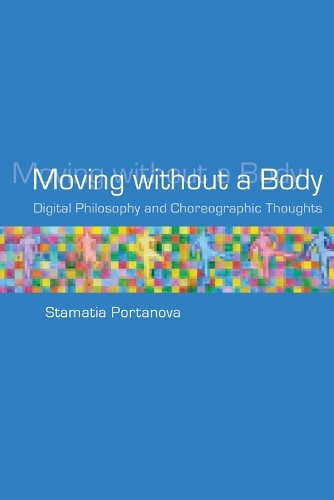
Moving without a Body: Digital Philosophy and Choreographic Thoughts
(Paperback)
Available Formats
Publishing Details
Moving without a Body: Digital Philosophy and Choreographic Thoughts
By (Author) Stamatia Portanova
MIT Press Ltd
MIT Press
6th February 2024
United States
Classifications
Tertiary Education
Non Fiction
Digital, video and new media arts
792.82
Physical Properties
Paperback
200
Width 152mm, Height 229mm
369g
Description
Digital technologies offer the possibility of capturing, storing, and manipulating movement, abstracting it from the body and transforming it into numerical information. In Moving without a Body, Stamatia Portanova considers what really happens when the physicality of movement is translated into a numerical code by a technological system. Drawing on the radical empiricism of Gilles Deleuze and Alfred North Whitehead, she argues that this does not amount to a technical assessment of software's capacity to record motion but requires a philosophical rethinking of what movement itself is, or can become. Discussing the development of different audiovisual tools and the shift from analog to digital, she focuses on some choreographic realizations of this evolution, including works by Loie Fuller and Merce Cunningham. Throughout, Portanova considers these technologies and dances as ways to think-rather than just perform or perceive-movement. She distinguishes the choreographic thought from the performance- a body performs a movement, and a mind thinks or choreographs a dance. Similarly, she sees the move from analog to digital as a shift in conception rather than simply in technical realization. Analyzing choreographic technologies for their capacity to redesign the way movement is thought, Moving without a Body offers an ambitiously conceived reflection on the ontological implications of the encounter between movement and technological systems. A radically empirical exploration of movement and technology and the transformations of choreography in a digital realm. Digital technologies offer the possibility of capturing, storing, and manipulating movement, abstracting it from the body and transforming it into numerical information. In Moving without a Body, Stamatia Portanova considers what really happens when the physicality of movement is translated into a numerical code by a technological system. Drawing on the radical empiricism of Gilles Deleuze and Alfred North Whitehead, she argues that this does not amount to a technical assessment of software's capacity to record motion but requires a philosophical rethinking of what movement itself is, or can become. Discussing the development of different audiovisual tools and the shift from analog to digital, she focuses on some choreographic realizations of this evolution, including works by Loie Fuller and Merce Cunningham. Throughout, Portanova considers these technologies and dances as ways to think-rather than just perform or perceive-movement. She distinguishes the choreographic thought from the performance- a body performs a movement, and a mind thinks or choreographs a dance. Similarly, she sees the move from analog to digital as a shift in conception rather than simply in technical realization. Analyzing choreographic technologies for their capacity to redesign the way movement is thought, Moving without a Body offers an ambitiously conceived reflection on the ontological implications of the encounter between movement and technological systems.
Author Bio
Stamatia Portanova is Research Fellow at the Department of Human and Social Sciences, Universit degli Studi di Napoli "L'Orientale" (Naples) and the author of Moving without a Body- Digital Philosophy and Choreographic Thoughts (MIT Press). She has published articles in AI & Society, Body & Society, Computational Culture, Space and Culture, Fibreculture Journal, and Angelaki.
